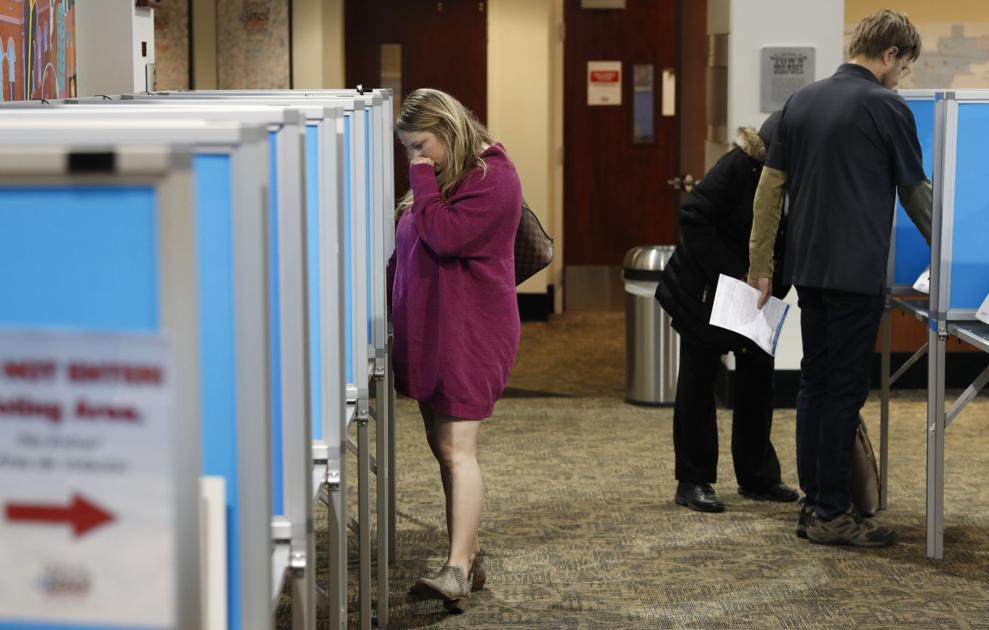
A host of advocates, organizations and elected officials past and present testified Monday in support of legislation seeking to increase access to ranked-choice voting at the local level as the bill cleared committee on a party lines.
But while the measure won support from the Colorado Municipal Clerks Association, the League of Women Voters and the Colorado Municipal League, among others, it received strong pushback from El Paso County Clerk and Recorder Chuck Broerman.
“As a guide, voting should be easy, clear-cut and assessable as possible and allow the greatest swath of voter participation as possible,” Broerman said. “House Bill 1071 fails to meet that test.”
Ranked-choice voting, also known as instant runoff, asks voters in elections with three or more candidates to rank their choices from most to least preferable. If a candidate fails to win at least 50% of the vote, the last-place candidate is eliminated and their votes reallocated to their voters’ second-choice candidate. Those instant runoffs continue until a candidate clears the 50% threshold, ensuring the winner has at least some level of support from a majority of voters.
Cities are already allowed to use ranked-choice voting, but only three — Basalt, Carbondale and Telluride — actually do. That’s because locals often rely on their county clerks to administer elections, and county clerks are required under state law to administer standard first-past-the-post elections.
The bill from Rep. Chris Kennedy, a Lakewood Democrat who chairs the House State, Civic, Military and Veterans Affairs Committee, would allow cities who opt in to instant runoff elections to continue to have their county clerks administer their elections. The bill also features Rep. Jeni Arndt, D-Fort Collins, and Senate Majority Leader Steve Fenberg, D-Boulder, as sponsors.
The ranked-choice voting system as a whole drew widespread support from the witnesses testifying before Kennedy’s panel. But several — including Matt Benjamin, who last year led a successful Boulder charter amendment to use ranked-choice voting in the city’s mayoral election starting in 2023 — said Kennedy’s bill was more broadly about local control.
“Instead of debating the merits of RCV, it should be whether or not we agree as a state, certainly as a committee and a House, whether we support local control and what that means for communities that want to choose their own fate and have the will of the voters decide the outcomes of their elections,” he said.
Former House Speaker Terrance Carroll, D-Denver, reinforced that point while testifying in support.
“This is what local control is all about,” he said. “Many people like to say that states are the laboratories of democracy — I would say that in Colorado, our municipal governments are laboratories of democracy and they allow us to look at evolving democratic norms to ensure that our democracy is truly representing the will of the people.”
But Broerman highlighted a host of issues, including concerns the system would “increase the prevalence of spoiled or exhausted votes.”
“Understanding the differences in policy between candidates to the point where a voter can meaningfully rank all candidates in order of preference requires a great deal of political savvy and engagement,” he said.
The panel’s Republicans also opposed the bill. Assistant Minority Leader Tim Geitner, R-Falcon, slammed it as an attempt to hand off the expenses of Boulder’s move to ranked-choice voting to taxpayers and businesses.
“For years towns like Telluride have been running their elections this way with no help from the state,” he said in a statement. “Boulder should make sure their fiscal house is in order before passing measures instead of coming to businesses across the state to fund their pet projects, especially during a time when many are already struggling with keeping their doors open during the pandemic.”
That’s a reference to testimony from state Election Director Judd Choate, who said the price tag of roughly $1 million for the Secretary of State’s office to implement the necessary changes would largely be covered by raising fees.
Choate said Secretary of State Jena Griswold largely supports the idea of alternative voting methods. But he raised concerns about both the prospect of raising fees on businesses in the middle of a pandemic and the “tight” timeline the original draft of the bill presented.
“If this bill were advanced without amendment to extend the implementation timeline, our office would have roughly 18 months to deliver a substantial multi-component overhaul of our election system,” he said. “The timeline to do this significant work is exceptionally tight, especially given the need to go through a state procurement processes.”
Kennedy said he wasn’t able to speak with Griswold until last week. After hearing her concerns on the timeline, he today brought forward an amendment he said “split the difference” between her request to push implementation back to 2024 and Boulder’s 2023 election.
“What we thought would make the most sense is try to bifurcate this process so that everything that needs to be done for single county elections will be done ahead of the 2023 election,” he said. “But for any cities that span multiple counties, they're going to have to wait two more years until 2025 so that we can finish completing these statewide processes.”
Kennedy also said the fiscal note on the bill was designed “to try to take [costs] off the shoulders of the local government.” He said the Finance Committee, where the legislation heads next, will continue to work on the bill and pledge to examine ways to bring the overall cost down.
"choice" - Google News
February 23, 2021 at 06:18AM
https://ift.tt/3bpOwk8
Ranked-choice voting legislation clears committee on party-line vote - coloradopolitics.com
"choice" - Google News
https://ift.tt/2WiOHpU
https://ift.tt/3c9nRHD
Bagikan Berita Ini














0 Response to "Ranked-choice voting legislation clears committee on party-line vote - coloradopolitics.com"
Post a Comment